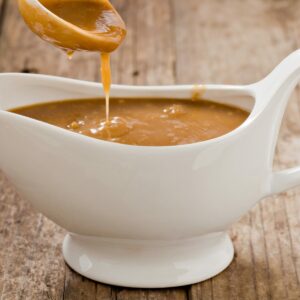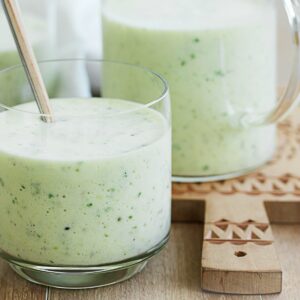
The season of excess can play havoc with our digestive system, triggering uncomfortable attacks of indigestion and acid reflux. Healthy Food Guide looks at ways to settle or avoid a stomach upset ruining your festivities.
Indigestion solutions
Stress, alcohol, rich food and too much of it… It’s the optimal blend for triggering a bout of indigestion or acid reflux. With families thrown together (and nerves often jangled) and food and drink on tap, an attack is almost as predictable during the festive period as Christmas cracker jokes.
‘Indigestion and acid reflux are particular problems at Christmas, when a steady stream of food and drink is laid out to tempt us,’ says HFG expert and GP Dawn Harper. The type of food and drink that’s especially rich, that is, and often consumed late into the night.
Don’t worry about the occasional attack – while uncomfortable, it’s unlikely to do any real harm. But indigestion and acid reflux can be a good indicator that you need to keep calm and rein in the indulgences.
So what’s the difference?
Acid reflux is a condition rather than a symptom. It’s caused by acid flowing back up from the stomach into the oesophagus. It causes an unpleasant taste in the back of the throat or mouth, and may present with any of the symptoms of indigestion listed below.
Indigestion is a symptom or a collection of symptoms. It can present as pain or discomfort in the stomach (dyspepsia), a burning pain or discomfort behind the breastbone (heartburn), nausea, bloating, flatulence and/or belching. It’s often a side effect of overeating, eating rich, spicy or fatty foods, or drinking too much alcohol, and can be a symptom of acid reflux.
Get it often? Get it checked
Statistics show around one in five of us suffers from acid reflux at least once a week, while one in 10 suffers on a daily basis. This more frequent type of attack is a condition known as gastro-oesophageal reflux disease (GORD), which generally requires medication to treat it rather than dietary changes alone.
‘Most of us will experience indigestion or acid reflux at some point, but if symptoms persist for two or three weeks, it’s important to seek medical advice to obtain a diagnosis,’ explains Dr Harper.
Your GP will check for any underlying health issues and may refer you for tests, such as an endoscopy: a thin, flexible tube with a camera at the end is lowered down the throat into the stomach to assess what’s going on. This helps to rule out or diagnose serious conditions such as oesophageal cancer.
‘Eating fatty foods, eating late and drinking certain types of alcohol such as very acidic white wine and spirits to excess can paint-strip your stomach lining,’ warns Jeremy Sanderson, consultant gastroenterologist at Guy’s And St Thomas’ Hospital in London. ‘An endoscopy will reveal this damage and the chances of you going on to develop cancer.’
The long-term effect
Over a long period, the acid that comes back up from the stomach irritates the lining of the oesophagus, which can cause cell changes (Barrett’s oesophagus) that sometimes lead to oesophageal cancer. Worryingly, those who are most at risk are usually uncomplaining. ‘A lot of men with acid reflux trundle along for years without seeking medical advice,’ says Dr Sanderson.
Watch your weight…
A study by Cancer Research UK estimated that being overweight or obese causes more than one in four oesophageal cancers in men and more than one in 10 in women. This is, possibly, because obesity increases the risk of suffering from acid reflux due to the pressure on the stomach.
…and your stress levels
As well as diet triggers, stress is a contributory factor. Stress can affect our food choices and lead us to eat more than we need – so the vicious circle continues.
How to manage the triggers
1 Be portion-wise
Eating too much puts pressure on the lower oesophageal sphincter and the stomach produces more gastric acid. And overeating consistently, along with being over a healthy weight range, can increase pressure on your stomach.
Tip Use smaller plates to reduce portion sizes and check out our portion guide.
2 Avoid eating before bed
If you lie down straight after dinner, you’re more likely to suffer discomfort as the food won’t have had time to move on from your stomach.
Tip Eat earlier in the evening so food is able to move through the digestive system before you go to bed.
3 Limit alcohol
It irritates the linings of the oesophagus and the gut.
Tip Choose lower-alcohol beverages and drink them with a meal, not on an empty stomach – and avoid very dry white and sparkling wines.
4 Try less caffeine
Tea and coffee boost the amount of acid produced in the stomach and can also increase the pressure on the valve in your lower oesophagus, which exacerbates acid reflux symptoms.
Tip Choose decaffeinated varieties, water, milk or herbal teas instead – chamomile tea is a great choice, especially if you’re stressed. If you can’t face the day without a trip to the coffee shop, ask for only one shot or make your own milder version at home.
5 Forget the fizzy drinks
Carbonated drinks (both soft and alcoholic) can bloat the stomach, which may lead to symptoms of acid reflux.
Tip If you’re prone to bouts of indigestion or acid reflux, it’s best to avoid fizzy drinks entirely. Flavour water with cut-up fresh herbs and fruit.
6 Citrus and tomatoes
Our stomach acid is much stronger than the acid in fruits such as oranges, lemons and tomatoes. However, these foods can make acid reflux worse for some people.
Tip Eat smaller amounts of potentially irritating foods and monitor how this reduced intake affects your symptoms. When you do eat acidic foods, pair them with something to neutralise their effects – such as tomato sauce with pasta rather than raw tomatoes in a salad. Or swap them for other fruits that are less likely to trigger an attack, such as bananas, pears and berries.
7 Less spice is more
Spices such as chillies, along with aromatics such as garlic and onion, are gastric stimulants. In response, the stomach produces more acid.
Tip Eat milder curries made with fewer spices, and swap garlic and onions for milder herbs such as chives.
Article sources and references
- Cancer Research UKhttps://www.cancerresearchuk.org/?ds_kids=p176392383&adc=cpc
- Eun Mi Song, Hye-Kyung Jung and Ji Min Jung. The Association Between Reflux Esophagitis and Psychosocial Stress. Dig Dis Sci. 2013 Feb; 58(2): 471–477. Published online 2012 Sep 22. doi: 10.1007/s10620-012-2377-zhttps://www.ncbi.nlm.nih.gov/pmc/articles/PMC3576549/#:~:text=Stress%20can%20exacerbate%20heartburn%20symptoms,specific%20stressful%20conditions%20%5B24%5D.
- Tao-Yang Wei, et al. The role of tea and coffee in the development of gastroesophageal reflux disease. Tzu Chi Med J. 2019 Jul-Sep; 31(3): 169–176. doi: 10.4103/tcmj.tcmj_48_18https://www.ncbi.nlm.nih.gov/pmc/articles/PMC6559035/
- Mirosław Jarosz, et al. Risk factors for gastroesophageal reflux disease: the role of diet. Prz Gastroenterol. 2014; 9(5): 297–301. Published online 2014 Oct 19. doi: 10.5114/pg.2014.46166https://www.ncbi.nlm.nih.gov/pmc/articles/PMC4223119/
www.healthyfood.com










